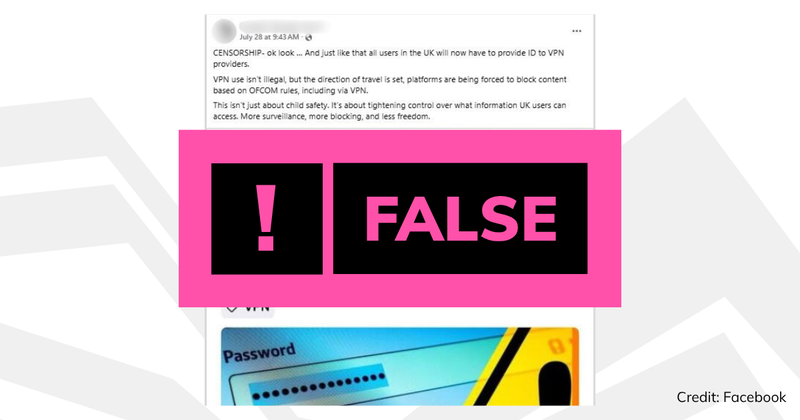A misleading claim that people in the UK will need to provide ID to use virtual private networks (VPNs) has been circulating online. This comes as the Online Safety Act takes effect, which requires websites publishing pornography and harmful content like self-harm to introduce age checks, which in turn has led to increased downloads of VPNs and other content reportedly being blocked by social media companies.
A now-deleted post on X (formerly Twitter) has also been circulating on Facebook, which includes a screenshot of a news article, with the highlighted headline saying: “Massive VPN update confirmed as all UK web users hit by major change this month.”
The screenshot is captioned: “‼️ CENSORSHIP- ok look … And just like that all users in the UK will now have to provide ID to VPN providers.
“VPN use isn’t illegal, but the direction of travel is set, platforms are being forced to block content based on OFCOM rules, including via VPN.”
VPNs allow secure encrypted connections between the user’s device and the VPN provider’s server over the internet, which masks the user’s IP address (the unique identifying number assigned to internet-connected devices) and their location. Company staff might use them to access private work systems while not in the office or on public WiFi networks, while others may use them to access websites that are blocked in their country or otherwise restricted by location—such as streaming sites.
Under the Online Safety Act, which has just come into force, platforms which feature pornography, self-harm, suicide and eating disorders, are required to use secure methods like facial scans, photo ID or credit cards checks to verify the age of their users to prevent children from accessing them.
However, users in the UK do not need to provide identification to use a VPN.
The screenshot featured in the social media posts is from a 28 July article from the Daily Express, which reports on the Online Safety Act age verification checks coming into force to prevent children under the age of 18 accessing harmful online content or pornography sites.
It reports one VPN provider as saying that there had been an increase in users since Ofcom, the communications regulator, began enforcing rules around age verification for adult websites and apps on 25 July.
But nowhere in the article online, nor in archived versions of the piece, does it say that VPN users will need to provide ID in order to access these networks.
The new legislation also makes no mention of virtual private networks, or their acronym, VPN.
The account that originally made the claim on X told Full Fact their post was based on the Daily Express article, saying “While I now see that there is currently no legal requirement for UK VPN users to provide ID, the article's tone—and the regulatory trajectory it describes—contributed to my interpretation that identity verification for VPN use could be a logical next step.”
They have since deleted their post on X.
We have also seen a misleading graphic circulating on social media that claims that VPNs are illegal in the UK.
VPNs are legal in the UK. But the government expects platforms that provide adult content to have a “clear responsibility to prevent children from bypassing safety protections” which includes blocking content that promotes VPNs as workarounds aimed at young users.
This also means that platforms that promote VPN use to children in the UK could face enforcement action, such as financial penalties.
Peter Kyle MP, the Secretary of State for Science, Innovation and Technology, said on 29 July that he was not considering banning VPNs, saying it was “not on the cards”.
Before sharing information that you see online, first consider whether it comes from a reliable and trustworthy source. Our toolkit provides practical tools anyone can use to identify bad information.
